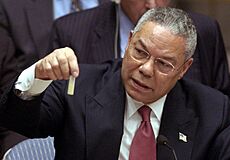United Nations Population Fund facts for kids
Quick facts for kids  United Nations Population Fund |
|
|---|---|
 |
|
| Status | Active |
| Headquarters | New York City, United States |
The United Nations Population Fund (UNFPA) is a United Nations agency that works to improve the health of mothers and children all over the world. It helps countries create better healthcare plans.
The UNFPA also leads campaigns to stop harmful practices like child marriage and violence against women. It works in more than 144 countries and is a key member of the United Nations Development Group. This group works to achieve the Sustainable Development Goals, which are goals to make the world a better place.
Contents
How the UNFPA Started
In 1966, twelve world leaders asked the United Nations to help with population issues. A special fund was created in 1967 to do this. The agency officially started its work in 1969 as the United Nations Fund for Population Activities.
In 1971, it was placed under the control of the United Nations General Assembly. The name was changed to the United Nations Population Fund in 1987, but people still use the short name UNFPA.
What the UNFPA Aims to Do
Helping Achieve Global Goals
In 2015, all 193 member countries of the United Nations agreed on the Sustainable Development Goals. These are 17 goals to improve the world over 15 years. They aim to end poverty, unfair treatment, and preventable deaths.
UNFPA helps with many of these goals. It focuses on Goal 3 (good health), Goal 4 (quality education), and Goal 5 (gender equality). By helping women and young people, UNFPA helps make progress on many other goals too.
A Warning About Fewer Births
In June 2025, the UNFPA released a report about declining birth rates. This means that in many places, people are having fewer children. The report was based on a survey of 14,000 people in 14 different countries.
Dr. Natalia Kanem, the head of UNFPA, said that one reason people have fewer children than they want is because raising them is expensive. This report was important because it was one of the first times the UN focused so much on the issue of low birth rates.
Leaders of the UNFPA
These are the Executive Directors who have led the UNFPA.
| Executive Director | Country | Period | |
|---|---|---|---|
| 1 | Rafael M. Salas | 1969–1987 | |
| 2 | Nafis Sadik | 1987–2000 | |
| 3 | Thoraya Ahmed Obaid | 2001–2010 | |
| 4 | Babatunde Osotimehin | 2011–2017 | |
| 5 | Natalia Kanem | 2017–present |
Main Areas of Work
UNFPA is the world's largest public source of money for population and reproductive health programs. It works with governments and other groups in over 150 countries.
Its main goals are to help people:
- Plan their families and avoid unwanted pregnancies.
- Have a safe pregnancy and childbirth.
- Reduce violence against women.
- Increase equality for women.
UNFPA focuses on three main targets:
- Zero preventable deaths of mothers during childbirth.
- Zero violence based on gender.
- Zero families who need family planning but can't get it.
How the UNFPA Works
UNFPA partners with governments, other UN agencies, communities, and companies. Together, they raise awareness and get the resources needed to help women and young people. For example, it is one of the sponsors of the Special Programme on Human Reproduction.
In 2016, governments and private groups gave $848 million to UNFPA. However, the COVID-19 pandemic caused economic problems, and the United Kingdom had to cut its funding to UNFPA by 85%.
Important Campaigns
Campaign to End Fistula
Obstetric fistula is a serious injury that can happen during childbirth. It can cause health problems and make women feel isolated. UNFPA leads a global campaign to prevent and treat this injury.
The campaign works in over 50 countries. It helps train doctors, provides medical supplies, and supports women who have recovered. The goal is to end fistula and help survivors rebuild their lives.
Relationship with the U.S. Government

Some groups in the United States have disagreed with UNFPA's work. They were concerned that UNFPA supported government programs that forced people to make family planning choices they did not want. UNFPA states that it is strongly against forcing anyone to do anything.
Because of these concerns, some U.S. presidents have stopped giving money to UNFPA. This is often called the Mexico City Policy. Other presidents have restored the funding.
For example, during the George W. Bush administration, funding was blocked. The administration believed that UNFPA's work in China helped the government's coercive programs. However, investigations by the U.S., the U.K., and the UN found no evidence that UNFPA was involved in any forced programs.
When the U.S. stopped its funding, many other countries, especially in Europe, gave more money to help fill the gap.
In 2009, President Barack Obama restored funding to UNFPA. He said it was important to work together to reduce poverty and improve the health of women and children.
In 2017, the Trump administration cut funding again, stating similar concerns as past administrations. UNFPA replied that all of its work protects the human rights of people to make their own choices without being forced.
Other UN Population Groups
- Commission on Population and Development
- United Nations Department of Economic and Social Affairs
See also
 In Spanish: Fondo de Población de las Naciones Unidas para niños
In Spanish: Fondo de Población de las Naciones Unidas para niños
- Reproductive Health Supplies Coalition
 | Selma Burke |
 | Pauline Powell Burns |
 | Frederick J. Brown |
 | Robert Blackburn |


